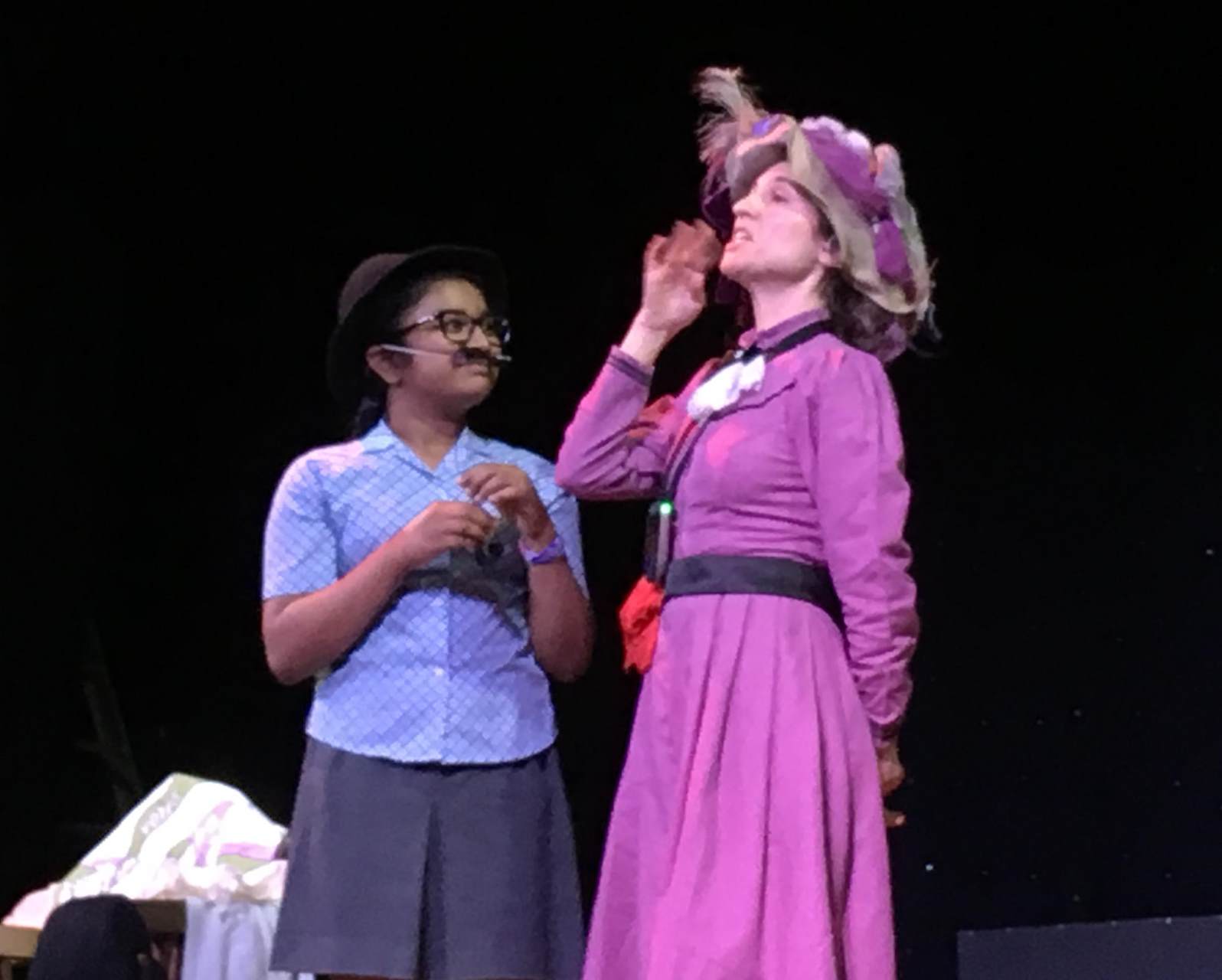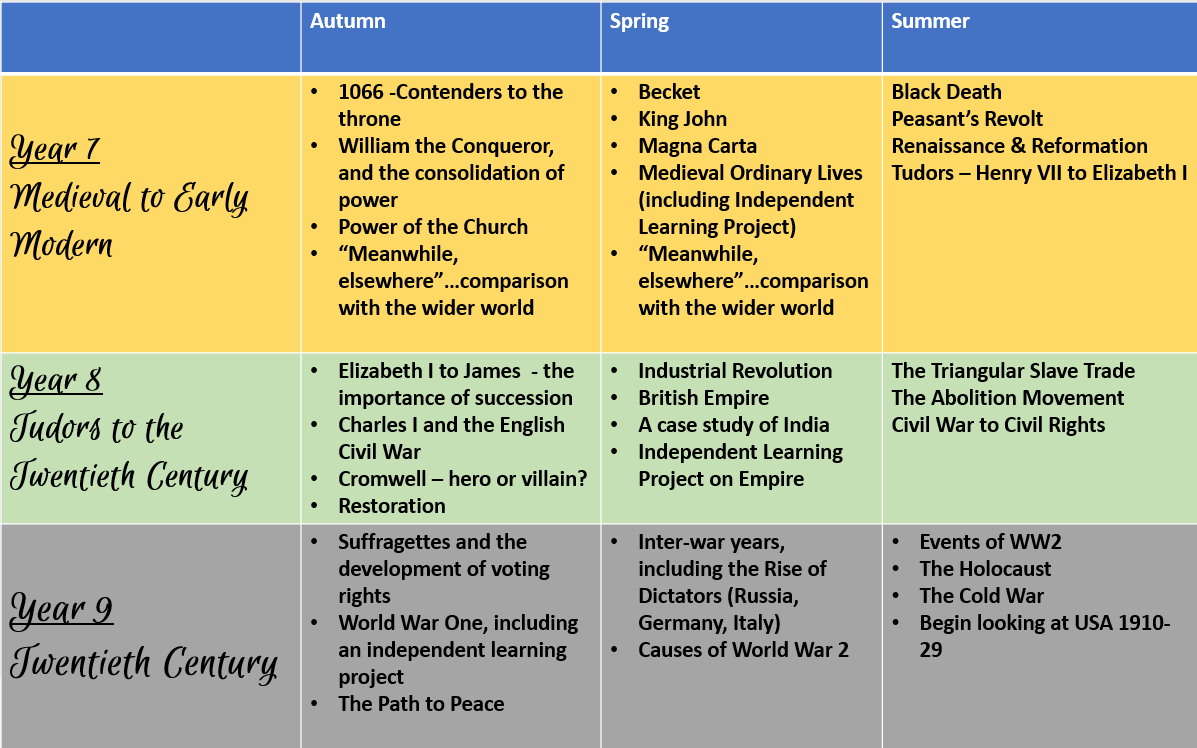History 
History is thriving at Beaconsfield High School. We have achieved some excellent results at both GCSE and A Level, and we are situated in our purpose-built humanities block. History is very popular within the school, with over three quarters of students opting for the subject at GCSE. This popularity is a result of excellent teaching, committed staff and real enthusiasm for the subject which is shared by staff and students alike. We love our subject, and our prime objective is always to imbue students with a similar passion for History.
History - Curriculum Intent
Our central mission as History teachers is to empower our students to question the world around them, guided by an understanding of past events and concepts and how they have shaped our current societies. We firmly believe that History is not simply factual content; instead this content should be a platform from which all of our students, regardless of their starting point and background, can develop the skills to find answers to their questions and encounter perspectives beyond their own. Our rationale is therefore to achieve a balance between a sense of historical period/chronology, and the metacognitive skills required to foster lifelong curiosity and learning. We consequently structure our curriculum chronologically with thematic and metacognitive review points embedded, starting with the medieval era and ending in the 20th century. We ensure that a wide variety of topics are offered to ensure diverse histories are represented.
The key concepts underpinning our teaching at all levels are reflected in our level descriptors. We teach students to understand different interpretations, significance, continuity and change, and cause and consequence. Our lessons therefore aim to embed skills in source analysis and comparing interpretations, as well as analysing contextual material to reach substantiated evaluations and judgements. These same skills are assessed throughout the curriculum at increasingly advanced levels and with new content, allowing students of all abilities and needs to build on their prior learning and achieve progress. Throughout the curriculum, we have also incorporated activities which require students to develop their skills in independent and collaborative research and the management of long-term projects, key to the ‘getting life ready’ agenda. The school’s commitment to literacy is also reinforced in History as we guide students towards effective and balanced communication, both orally and in written form.
Years 7, 8 & 9 History
During Years 7-9 students have three History lessons over two weeks. They follow a broadly chronological approach to give them a ‘sense of period’, starting with Medieval History and reaching the post-WW2 era by the end of Year 9 (see schedule below). The curriculum also incorporates regular 'meanwhile, elsewhere' segments to broaden student understanding of events across the globe during the periods they are studying. We also include a wide variety of topics to ensure that diverse histories are represented. Throughout this process students will be taught key transferable skills including source analysis and evaluation, how to structure and substantiate written essays and how to compare and contrast historical interpretations. We firmly believe in the value of historical curiosity, and this, combined with our desire to foster lifelong learners, has resulted in the department embedding an independent learning project every year which teaches students about research skills, managing their time, and pursuing an area of independent enquiry beyond the taught curriculum. Our resource records for this very much reflect an age-appropriate version of the records required for students in their A-level coursework, to foster mature historical skills from the outset. We also reward students for reading widely around the subject, and have a forum for them to recommend historical books to one another. This could well earn them the coveted History Hero badge!
The department utilises a wide variety of teaching resources and strategies, including source work, role plays, debates, and written and oral presentations. A variety of textbooks and other resources - including pictures, video, and music-based activities are used to enable students to develop their historical skills and appreciation of the subject. As a department, we make use of metacognitive strategies, including recall and review elements, to ensure students can build on prior learning and develop a deep understanding of the skills within the subject, and to give them the confidence to draw out the thematic links and connections present throughout the curriculum.

Year 10 and Year 11 GCSE History
Students follow the WJEC course, which examines ‘Studies in Depth’ and ‘Studies in Breadth’.The depth study consists of a 2 hour examination, split into two papers of 1 hour each. The topics covered are:
1B: The Elizabethan Age, 1558-1603
1H: The USA: A Nation of Contrasts 1910-1929
The breadth study consists of a 2 hour examination, split into two papers of 45 minutes (Period Study) and 1 hour 15 minutes (Thematic Study). The topics covered are:
2B: The Development of Germany, 1919-1991 (Period Study)
2F: Changes in Health and Medicine in Britain, c.500 to the present day. The requirement to study a historic site is part of the Thematic Study.
In Year 10 students study the USA, Germany and half of the Medicine course.
In Year 11 students complete the Medicine topic, and then study the Elizabeth paper.

 Beaconsfield High School
Beaconsfield High School